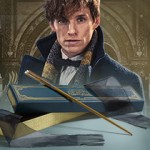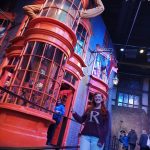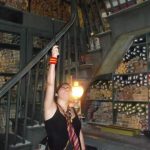Let Us Fansplain You About Harry Potter, “Fantastic Beasts” Reviewers

Nov 16, 2016
Fan Sites, Fans, Films, Leaky, Movies, News, Opinion
We get it: people have been waiting a loonnnnng time to be dismissive about Harry Potter: We aren’t in the thrust of a full phenomenon anymore, we aren’t riding the wave of an Internet frenzy, we aren’t on the cover of Time, and we aren’t dominating all news headlines daily. You thought we went away.
But oh, did we not. We may have been quiet, but we are all still here. We are legion. And we are all still fiercely defensive when people who make uninformed, half-a-loaf attempts to slam a series they couldn’t quite manage to get rid of last time.
So if you’ve been sharpening your knives all this time to show off your distinct dislike of a series you barely read and never understood?
It’s cool, boo. We’ve got you.
Earlier today, Leaky staff saw this review of Fantastic Beasts and had a collective eye-roll at the negativity therein. But this isn’t just an opinion formed on what seems to be a closely held dislike of the series; this seems to be an opinion formed on strange non-facts about the movie and the series as a whole.
We decided to fix the errors. Staffer Leah Cornish, with feedback from most of the rest of the Leaky-and-LeakyCon staff, now presents a point-by-point rebuttal of this review, and a formal notice to anyone making up false facts to support savage opinions: we are only greater in number now, and we are watching.
Also, HERE BE SPOILERS. If you don’t want spoilers, read this after you see the movie. (TODAY! TODAY! Or tomorrow, depending where you live!)
~*~
By Leah Cornish (and Leaky staff):
Here at Leaky we believe in people having their own opinions. We also, however, happen to be big huge Harry Potter nerds and are defensive of the things that we love. A few people pointed out that the review from Polygon for Fantastic Beasts and Where to Find Them was particularly savage. So we went through it. And we can not let it stand.
[For the record I do not think that Fantastic Beasts is a perfect film. It’s not going to win any of the big awards this season. It has a problem with pacing, particularly in the first 30 minutes of the film, and could stand to be a little shorter. But none of these are what the below review calls out as flaws. Instead it’s not much more than a person who, I can guarantee, went into the theater determined to dislike what he watched. It is the review equivalent of a boring person saying “Ugh. More Harry Potter? Lame.” It’s the only logical conclusion I can come to for why the review so handily missed the point of the film.]
Beyond their shared author, J.K. Rowling, to what extent is the lavish new fantasy Fantastic Beasts and Where to Find Them related to the popular saga of Harry Potter, exactly?
Their world? Continue.
They share no characters or settings;
Considering Beasts takes place in another country than, and 50 years prior to, Harry Potter, that wouldn’t be surprising. However your statement is incorrect. The series actually DO share a character and his name is the first one you see on the screen in the new film: Grindelwald. Additionally, Albus Dumbledore, while he does not appear, was name dropped in a scene that was featured in trailers. So score one for reading comprehension.
Also, Newt Scamander is part of the original canon. His name is one one of the ten books released up to and including 2007. He is even mentioned in the very first Harry Potter book. Newt Scamander is the main character, remember?
The literal answer would be that Warner Bros.’ latest blockbuster-in-the-making branches off from Harry’s adventures with the backstory of a textbook he uses for a Care of Magical Creatures class he takes, like, one time.
Harry actually takes the class 3 times (years 3-5) and, while he does use it in said class, it is part of his year 1 reading list. Consider Fantastic Beasts to be a base level comprehension text.
(Spinoffs can come from anywhere — isn’t the world a wondrous place?)
Indeed, spinoffs can come from anywhere. What is your point here? Oh. I see. It’s sarcasm. Because everyone likes to moan that there is no originality left in the world. Never you mind that Rowling took a 40-page booklet that described fake animals and turned it into a worldbuilding film whose sequels will explore the first Wizarding War…no. You’re right. No originality. Also it’s less a spinoff and more of a companion piece, but that’s just semantics. Continue!
But the truest unifying element between the two is their shared sense of escapist amazement, the intention to immerse the reader in an infinitely detailed world that they can explore again and again. In this respect, the technically mighty Fantastic Beasts succeeds with great aplomb, taking viewers around tableaux bustling with CGI detail via swooping, elaborate crane shots. Viewers in search of nothing more than a portal back to the wizarding realm of endless possibility will be amply satisfied by the many flourishes of production design that clutter the wide shots. And it’s the little things hinting at a world twice lost — not just that of magic, but of antiquated magic — that conjure some charm, smaller touches like self-click-clacking typewriters or outlandish costumes that convey both the period and milieu.
I agree!
Fantastic Beasts, with its cracking action set pieces and commitment to dense world-building, will make for a marvelous theme park attraction someday.
I agree again – look at us go!
But as a movie, as a vessel for narrative and ideas enacted by recognizably human characters, it fails to tap into the same simple potency that Harry and Co. wielded from book one.
I am curious here. Why are you comparing the Fantastic Beasts film to the Harry Potter books? I mean, I disagree with you in general, but you should be comparing this film to Harry Potter and the Sorcerer’s Stone directed by Christopher Columbus. A movie, that serves as an origin for a larger story, that is adapted from source material for the big screen.
Director David Yates constructs a thrill ride that can stand comparison with his towering adaptations of the later novels…
I agree!
…and yet it’s Rowling that doesn’t hold up her end of the bargain, delivering a script with the nuance and complexity of, well, a thrill ride.
Nuance I can give you a little bit, but certainly not complexity. The script abandons the three-act structure completely. It’s entire FOUNDATION is complex.
Fantastic Beasts (the fictional book, not the movie) was penned by one Newt Scamander (Eddie Redmayne, quieter and less intelligible than ever), a globetrotting zoologist spreading his message of humane treatment for creatures great and small as he conducts research for the tome. Newt’s a slippery sort of character, difficult to describe due to his total lack of distinguishing or otherwise memorable characteristics.
I agre- wait what?
He’s a little like Indiana Jones, but without the rakish charisma.
Cause he’s not a rake.
He’s a bit like Q from the James Bond franchise, but with the role of hero awkwardly foisted on him.
Cause it’s not foisted on him. He arrives already a hero to the creatures he’s rescued, and he LITERALLY saves New York City before departing.
He’s a bit like all the other characters Eddie Redmayne has played (save his howling alien king in Jupiter Ascending), in that he reads his lines with the vitality of a leaf clinging to a tree.
I’ll give you the cheap shot at Redmayne’s tendency to be a bit of a mush mouth, but in no way is he playing the same character in every movie. Redmayne has been typecast a few times as the timid character, but just because the characters share that trait do not make them the same. Please go back and revisit Marius – a Gryffindor-like boy who falls in love with the first blonde he bumps into and then fights in a revolution during which he may surely die. I don’t believe him to be the same as Stephen Hawking. Do you?
Mostly, however, he’s like not much of anything, barely present in his own story.
Ah. I see. You’ve missed the point of Newt. Don’t worry, I got you. Newt doesn’t want to be the center of attention. He doesn’t want this to be his story. And to be frank, it’s not his story at all.
Newt is the catalyst for beginning the stories of the people he meets. He starts the story for Jacob. For Queenie. He kickstarts Tina’s comeback after her fall from grace – he makes sure she gets her sequel. Newt by his nature looks out for others. He’s a caretaker. He is an intricate part of the story, but it does not belong to him.
And just as Rowling’s novels compensated for Harry’s vacuum of personality by making Ron and Hermione more compelling characters…
STOP. STOP RIGHT THERE.
First off, Harry Potter is a lot of things: he’s stubborn. Temper prone. A tiny bit selfish. Too quick to run his mouth. Loyal to a fault. Smart. Witty in a very dry sense. Hero-prone.
Look. Look at allllll those personality traits I just listed out for you. Hermione and Ron may have more dynamic characters (and that’s a S T R E T C H) but that’s because they are meant to complement Harry and each other. Harry is not my favorite character by a long shot, but just because he may often be annoying (we are seeing the world through his eyes after all) doesn’t mean he has no personality. I’m going to assign you some extra reading, please see me after class.
…so too does Rowling piece together a pair worth taking an interest in for Fantastic Beasts.
So you’re mad at J.K. for creating interesting side characters? Why do you hate fun?
Scamander’s busted suitcase lets a menagerie of enchanted fauna loose in the Big Apple, and his frantic efforts to retrieve them all before the magical five-oh realize what he’s done acquaint Newt with the no-maj (that’s American for “muggle”) Jacob Kowalski, played sweetly and earnestly by Dan Fogler. He, somehow, is the real hero in this faint semblance of a story. He’s our audience surrogate, sharing our gape-mouthed astonishment at the hidden universe of witchcraft and wizardry as he teams with Newt to retrieve the wayward monsters. He’s got a recognizable arc and interior life, hoping to escape the factory job he had to take after returning from World War I by opening up a bakery. And he’s on romance duty as well, falling hard for telepathic flapper Queenie (Alison Sudol).
My BIGGEST takeaway from this, aside from the fact that I agree with you on Jacob), is that you don’t understand why you like him so much, even though you stated it yourself.
Jacob is our surrogate. The audience doesn’t know what New York wizards are like. Nor adult wizards. Nor 1920s wizards. We as an audience would not be able to follow the film at all if it weren’t for Jacob. We need to share his surprise and his awe. We need him to ask the questions for us. And yes of COURSE Jacob is our hero. He is the everyman. He has what is closest to the hero’s journey in the movie. He even makes the biggest sacrifice in the end. And if we didn’t like him? If J.K. Rowling didn’t infuse him with everything that makes him lovable, his sacrifice would not have mattered at all.
Why am I explaining story structure and character right now?
Queenie enters the story as the sister of Tina Goldstein (Katherine Waterston), a desk jockey at the magic FBI who tackles Newt’s case off the books, and the other worthwhile character in the mix. Though Rowling doesn’t give Waterston much more to work with than the vague outline of “gal with moxie,” the actress makes an amusing mode of her constant exasperation with Newt.
I find it pejorative the way you quoted “gal with moxie” as if that can’t be a good trait. Especially considering it is more than moxie that forced her to stand up to the President of MACUSA on multiple occasions or to step in for a no-maj child who was being abused by his adopted mother.
She brings a spark of life to the scenes they share together, and though they have exactly zero chemistry, the script has the mercy not to graft a romance onto the two of them.
They have zero chemistry… the script has the mercy not to graft romance… Buddy. You’re killing me.
They don’t have romantic chemistry because they are NOT meant to be seen as a romantic pair yet. Tina clearly likes Newt. Newt is not used to being liked in any sense and may even be somewhere on the autism spectrum so he doesn’t know who he likes yet.
He cares for his new friends. He wants to have more adventures with Tina. Newt needs more experience before he can work on being a romantic partner to anyone.
Stop acting like finding love is the only worthwhile thing for a main character to do.
She assists Newt as they contend with threats on two sides: a group of religious fanatics called the Second Salemers intent on destroying the wizards and witches lurking among the population, and a disturbingly intense Auror (Colin Farrell) on their tails who also harbors a dark secret. The antagonists act as the conduit through which Rowling shoves misshapen metaphors intended to convey some facile commentary on present events.
I’m not even going to really comment on this except to say that I just refrained from calling you a bad name on a family friendly site. I’d also like to direct you to THE LUMOS WEB SITE so you can give money to a worthwhile foundation as penance for being a jerk.
Heaven forbid J.K. Rowling write something with allegories or direct commentary on current social events. She’s never done that before. (Dementors are an allegory for depression. The way wizards treat muggle-borns, werewolves, house-elves, etc. are direct commentaries on the way our society treats those of different races, sexual orientations, income levels, etc. Fudge, Umbridge, and Scrimgeour are all parallels to the different roles government plays in our lives for better or for way way worse. Death Eaters are BASICALLY NAZIS.) But you’re right. This is the first time you’ve had to suffer through J.K. Rowling “shoving metaphors” into a work of fantasy fiction.
*holds boombox over head*
*Power of Love blares through it*
The vague tensions between the human and wizarding communities can be easily contoured to fit whatever issue you like, for one. But even more half-baked is a subplot involving bowl-cut-sporting Credence Barebone (Ezra Miller), a Second Salemer and waste of a perfectly good gay porn name.
It’s actually just a pretty good regular porn name. Why’d you have to go and qualify it?
Also I’d say the subplot is less “half-baked” and more “purposefully not fleshed out until the very end because it’s actually going to be the plot of the next film and Rowling was using misdirection throughout the whole movie” but go on.
He’s searching for a child that refrains from “coming out” as a wizard for fear of judgement from peers…
You are now making light of the damaging psychological effect that “coming out” has on real children every.single.day. And I’m starting to get angry.
…and whose essence of denial manifests as a whirling torrent of pure destruction that levels city blocks at a time. The furious cloud of wreckage is weightless; the allegory is leaden.
Your thesaurus is worn out.
Rowling’s adventures with Harry were never exemplars of subtlety, but at least she knew how to string a basic Campbellian hero’s journey together and hit the beats for all they’re worth.
OK I’m going to say this again: with the exception of Jacob’s personal arc, Beasts is NOT A CAMPBELLIAN HERO’S JOURNEY. Maybe you’d enjoy the movie more if you didn’t expect it to be something it isn’t.
Fantastic Beasts feels misshapen and inessential by comparison, a series of events with plenty of digital spectacle but no larger meaning played out by thinly sketched characters.
If there’s no larger meaning, why’d you complain about J.K. Rowling inserting real world metaphors?
If the basic necessity of the film has started to grow unclear, note that the plans for a sequel were set in place before the public saw a single frame…
This is how most franchises are planned, sorry to break it to you.
…and the mercenary quality of the larger enterprise comes into focus. Yates, Rowling, Warner Bros., the American moviegoing public — we’re all subject to a force greater than magic or friendship or believing in yourself or whatever the prevailing theme of this two-hour-plus integrated brand vertical might be. The most powerful spell of all? Accio more money!
OK this is what always grates on me the hardest.
- You don’t have to see these films. Warner Bros. isn’t forcing you to watch them. From what I can tell, the only reason you watched this one is so you could emulate NPR’s writing style and take cheap shots at Eddie Redmayne.
- Movies exist to make money. That they often entertain or enthrall is just a bonus. Yes of COURSE Warner Bros. wants to make money off of this! That’s why, so many years ago, they optioned the film rights to two little charity school books. To make money.
The bonus is that J.K. Rowling decided that instead of just telling a story about a guy studying animals, she could actually tell the story of the first Wizarding War. But the only way to properly do that is to build that world. Let that sink in: we need an origin story for an entire fictional world.
We read the entirety of The Fellowship of the Ring learning history, getting to know characters, and believing in this group of misfits in their quest to melt a piece of evil jewelry. By the end two of them are dead, two kidnapped, two alone, and three are running through the woods without much of a goal. If people only cared about the main plot – destroying the ring – no one would ever go back to the first, or even second, Tolkien book. But the excessive amounts of characters? All the rules and history? All the subplots about politics and shadow governments and playing god and the downfall of living forever? All those big metaphors that Tolkien “shoved” in there? They’re what make the story worth revisiting.
TL;DR? Here is the point, friend:
You’ve tied yourself into knots and denied basic facts about the series, and also made casually insulting references to a lot of different types of people, in this review. Like Fantastic Beasts or don’t like Fantastic Beasts, but before you bring the psychological analysis and exemplars of subtlety, maybe treat the subject material with something akin to consideration.
It’s not like we can’t hear it! We’re the fans after all; we’re often the MOST outspoken when something about this series bothers us. But Harry’s like family; those inside can get away with being super critical, but those on the outside should make sure what they’re saying is based in, you know…facts.





